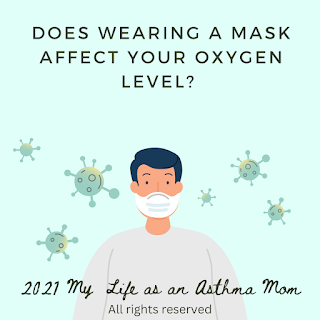Does Wearing a Mask Affect Your Oxygen Level?
A year ago, we were watching the news and seeing people in other countries dealing with the pandemic. Most were not allowed to leave their homes - and if they were, they were wearing masks.
Fast forward a year, and masks are part of our every day routine.
Before I leave the house, I think:
Keys - wallet - mask
I have a bag of masks in my office, my car and my purse. You never know when you might need a clean one.
As a life long asthma sufferer, I always wear a mask. I want to protect myself from any sick people that are coughing or sneezing near me. My three adult children and I have a habit of getting pneumonia or bronchitis at least once a year.
Long before people jumped on the Germophobe bandwagon, we were carrying hand sanitizer, antibacterial wipes (in the car and purse) and carefully washing our hands.
Yet, we still managed to get sick - and end up in the hospital.
In fact - my kids were in the hospital 12 times for asthma and 2 of those were ICU. Most of those were thanks to pneumonia (that started as a cold.)
In addition to worrying about catching a cold or seasonal flu, we are worried about getting COVID!
My family of asthma sufferers all wear masks. And even when my kids come home to visit (aka do laundry) on the weekend, they wear masks around my husband and I. They are worried about getting "the old folks" sick.
We are strong mask supporters.
But I have had other people tell me that they can't wear a mask because they have asthma.
A news release from American Academy of Allergy, Asthma & Immunology (AAAAI) has found that "Wearing a Mask Does Not Affect Oxygen Saturation in Patients With or Without Asthma."
For those of you who have an oximeter (oxygen monitor) at home, you may use it to check your oxygen level if your asthma is being cranky.
AAAAI's studied a clinic in Michigan and surveyed asthma patients who were wearing masks. They found that:
" Oxygen saturation (SpO2) ranged between 93-100%, with an average of 98%, for those with asthma. The range was 93-100%, with an average of 98%, for those without asthma."
Those oxygen levels are all considered to be in the "normal range."
They also say that:
"This data reinforces that wearing a mask, whether it is a surgical mask, cloth mask, or N95, is completely safe,” said author Alan P. Baptist, MD, MPH, FAAAAI, who performed the study along with colleagues Malika Gupta, MD, and Marisa Hodges, MD."
The full research on this study will be presented during the AAAAI annual conference on February 26th - March 1st.
So soldier on asthma friends and keep wearing those masks!

Comments
Post a Comment